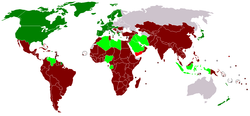International Fund for Agricultural Development: Difference between revisions
LizFantozzi (talk | contribs) No edit summary |
mNo edit summary |
||
| Line 26: | Line 26: | ||
}} |
}} |
||
The '''international fund of agricultural development''' ('''IFAD'''; {{lang-fr|Fonds international de développement agricole}} (FIDA)) is an [[International financial institutions|international financial institution]] and a [[specialised agency]] of the [[United Nations]] that works to address [[poverty]] and [[hunger]] in rural areas of [[developing countries]]. It is the only multilateral development organization that focuses on rural economies, [[food security]] and climate change.<ref>{{Cite web|title=IFAD at a glance|url=https://www.ifad.org/en/web/knowledge/publication/asset/39186603|access-date=2020-08-28|website=IFAD|language=en-US}}</ref> |
The '''international fund of agricultural development''' ('''IFAD'''; {{lang-fr|link=no|Fonds international de développement agricole}} (FIDA)) is an [[International financial institutions|international financial institution]] and a [[specialised agency]] of the [[United Nations]] that works to address [[poverty]] and [[hunger]] in rural areas of [[developing countries]]. It is the only multilateral development organization that focuses on rural economies, [[food security]] and climate change.<ref>{{Cite web|title=IFAD at a glance|url=https://www.ifad.org/en/web/knowledge/publication/asset/39186603|access-date=2020-08-28|website=IFAD|language=en-US}}</ref> |
||
Headquartered in [[Rome]], [[Italy]], IFAD is involved in over 200 projects across nearly 100 countries.<ref>[https://www.ifad.org/documents/38714170/39211820/ifadglance.pdf/31f8d586-6f4e-44d4-b27e-13491bb7aab9 IFAD at a Glance]</ref> It funds and sponsors initiatives that improve land and water management, develop rural infrastructure, train and educate farmers in more efficient technologies, build up resilience against climate change, enhancing market accessibility, and more.<ref>{{Cite web|title=Topics|url=https://www.ifad.org/en/topics|access-date=2020-08-28|website=IFAD|language=en-US}}</ref> |
Headquartered in [[Rome]], [[Italy]], IFAD is involved in over 200 projects across nearly 100 countries.<ref>[https://www.ifad.org/documents/38714170/39211820/ifadglance.pdf/31f8d586-6f4e-44d4-b27e-13491bb7aab9 IFAD at a Glance]</ref> It funds and sponsors initiatives that improve land and water management, develop rural infrastructure, train and educate farmers in more efficient technologies, build up resilience against climate change, enhancing market accessibility, and more.<ref>{{Cite web|title=Topics|url=https://www.ifad.org/en/topics|access-date=2020-08-28|website=IFAD|language=en-US}}</ref> |
||
Revision as of 15:21, 23 June 2022
This article needs additional citations for verification. (June 2020) |
 | |
 IFAD member states
List A members List B members List C members, ratification in force List C approved members, that still haven't ratified | |
| Abbreviation | IFAD |
|---|---|
| Formation | 15 December 1977 |
| Type | United Nations specialised agency |
| Legal status | Active |
| Headquarters | Rome, Italy |
Head | President Gilbert Houngbo |
Parent organization | United Nations Economic and Social Council |
| Website | ifad |
The international fund of agricultural development (IFAD; French: Fonds international de développement agricole (FIDA)) is an international financial institution and a specialised agency of the United Nations that works to address poverty and hunger in rural areas of developing countries. It is the only multilateral development organization that focuses on rural economies, food security and climate change.[1]
Headquartered in Rome, Italy, IFAD is involved in over 200 projects across nearly 100 countries.[2] It funds and sponsors initiatives that improve land and water management, develop rural infrastructure, train and educate farmers in more efficient technologies, build up resilience against climate change, enhancing market accessibility, and more.[3]
IFAD has 177 member states and works in partnership with the Organization of the Petroleum Exporting Countries (OPEC) and members of the Organisation for Economic Co-operation and Development (OECD). Since its foundation in 1977, IFAD has provided US$22.4 billion in loans and grants and coordinated an addition US$31 billion in international and domestic co-financing.
History
IFAD was established as an international financial institution in 1977 through United Nations General Assembly Resolution 32/107 (30 December 1977) as one of the major outcomes of the 1974 World Food Conference. Its headquarters is in Rome, Italy, and it is a member of the United Nations Development Group.[4] The President of the IFAD is Gilbert F. Houngbo from Togo, who was elected for a second four-year term in 2021, first elected in 2017.
See also
References
- ^ "IFAD at a glance". IFAD. Retrieved 28 August 2020.
- ^ IFAD at a Glance
- ^ "Topics". IFAD. Retrieved 28 August 2020.
- ^ "UNDG Members". Archived from the original on 11 May 2011. Retrieved 15 May 2012.
